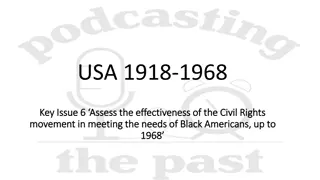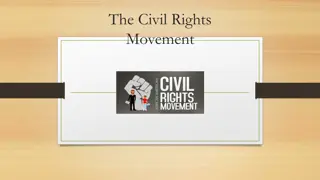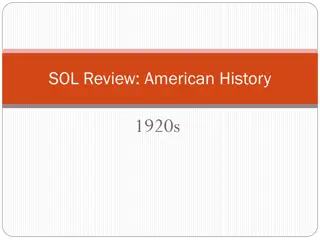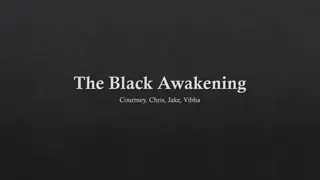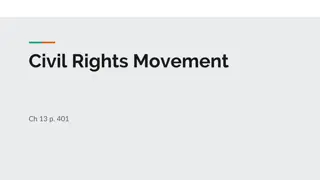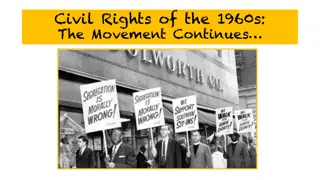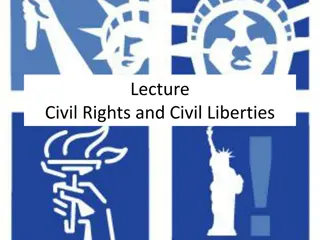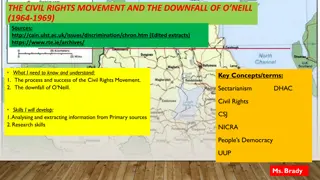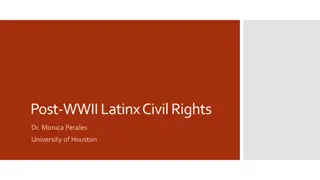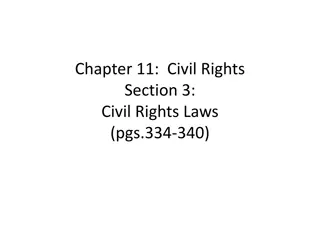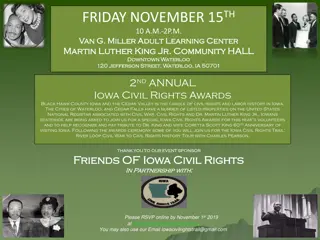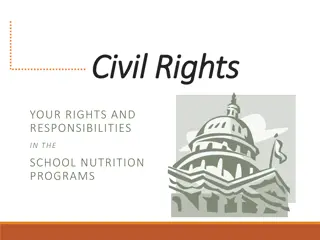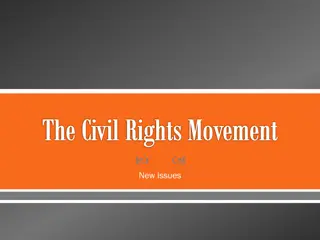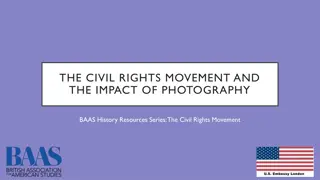Challenges and Progress in 1920s American Civil Rights Movement
The 1920s in America saw significant changes in civil rights, women's movement, and prohibition. Civil rights encompass personal freedoms guaranteed by the U.S. Constitution, including freedom of speech, voting rights, and protection from discrimination. Violations of civil rights have occurred throughout history, such as slavery, women's rights prior to 1920, Nazism, the Red Scare, and the Salem Witch Trials. Early civil rights activists like Booker T. Washington, W.E.B. Du Bois, and Marcus Garvey played pivotal roles in advocating for equal rights and opportunities, each offering unique approaches to advancing the black community. Washington emphasized education and self-improvement, believing it would lead to political and civil rights. Du Bois focused on education and civil rights activism, while Garvey promoted black pride and economic empowerment. These movements laid the foundation for future progress in civil rights.
Download Presentation

Please find below an Image/Link to download the presentation.
The content on the website is provided AS IS for your information and personal use only. It may not be sold, licensed, or shared on other websites without obtaining consent from the author. Download presentation by click this link. If you encounter any issues during the download, it is possible that the publisher has removed the file from their server.
E N D
Presentation Transcript
Changes In 1920s American Culture Civil Rights, Women s Movement, Prohibition
What are Civil Rights? Civil rights are personal rights guaranteed and protected by the U.S. Constitution and federal laws enacted by Congress Freedom of speech Right to vote Freedom of religion Equal rights under the law Protection from unlawful discrimination
Violations of your Civil Rights Can you name 2 instances, either in the US or outside, at any time in history that would be considered a violation of our Civil Rights today? Slaves/Black Americans Women prior to 1920 Nazism/Holocaust Red Scare Salem Witch Trials
The Black Movement The Early Civil Rights Movement (Early 1900s)
Name Solution Organization Booker T. Washington WEB Dubois Marcus Garvey
Booker T. Washington Born a slave 1856 Gaining an education, established the Tuskegee Institute, a prominent black school Believed blacks must concentrate on gaining an education, learning useful trades, and investing in their own businesses
Booker T. Washington Believed his way of thinking would lead to equal political and civil rights Advised for blacks to stop calling for an end to segregation and for voting rights
Booker T. Washington By his death in 1915, Washington had become a prominent leader of the black community His views did not advance the black cause
Name Solution Organization Booker T. Washington -Work Hard and learn a trade -Make yourself useful -Make white ppl want to give you rights -Don t waste time protesting Tuskegee Institute WEB Dubois Marcus Garvey
W.E.B. Dubois Born in Massachusetts 1868 Finished his formal education through a series of racially integrated schools and received his Ph.D. from Harvard
W.E.B. Dubois Disagreed with Washington s approach towards black civil rights We want to be Americans, full-fledged Americans, with all the rights of American citizens."
W.E.B. Dubois Claimed Washington s stance on segregation only encourages whites to continue to deny blacks their rights Helped form the NAACP (1909) National Association for the Advancement of Colored People Fought for civil rights through publications and court trials
Name Solution Organization Booker T. Washington WEB Dubois -Disagreed with Washington -Don t encourage the denial of rights -Protest and Boycott -Make yourself heard - NAACP Marcus Garvey
Marcus Garvey Born in Jamaica, 1887 Founded the Universal Negro Improvement Association (UNIA) Stressed racial pride and advancement similar to the preaching of Booker T. Washington
Marcus Garvey Believed that blacks and whites could never lived together in society Called for the complete separation of blacks and whites Wanted to create a separate economy and society for black citizens
Marcus Garvey Claimed that the KKK and UNIA had the same goals The vision of black separatism never caught on with the black community
Name Solution Organization Booker T. Washington WEB Dubois Marcus Garvey -Complete separation of whites and blacks -Black only communities -Universal Negro Improvement Association (UNIA)
Ku Klux Klan A new KKK appeared in the West and South at the start of the 20thcentury Harassing blacks, Jews, Roman Catholics, and foreigners
Ku Klux Klan KKK able to get 4.5 million native born, white Americans to join Klan domination in many states By 1925, America began to start seeing the awful acts of the KKK an avoided them
The Womens Movement Suffrage At Last
Chap. 17-2, PG. 557 Define/Identify Suffrage Carrie Chapman Catt Alice Paul Section Review Q s #4 and 6
Question What is suffrage? Why is suffrage important? Has the importance of suffrage decreased over time? Why do you think so?
Voting Stats in Federal Elections Presidential 1960- 63% Non-Presidential 1962- 47% 1972- 55% 1974- 38% 1988- 50% 1990- 37% 1996- 49% 1998- 36% 2008- 57% 2010- 44%
Use Your Knowledge!! Between 1840 and 1900 the average voter turnout for Presidential elections was approximately 75%... Why do you think this number is so much higher than more recent elections? Do you think we could ever reach that number again?
Susan B. Anthony Demanded the same rights for women as African Americans have Headed the National Women s Suffrage Movement 1872- Led a group of women into voting polls in New York
Susan B. Anthony Cont Arrested for Civil Disobedience Refusal to obey in an effort to change it President of the National American Woman Suffrage Association (NAWSA)- 1892-1900
NAWSA Fought for women and their right to vote Tried to get states to pass individual laws for women s suffrage Tried to amend the constitution
Arguments AGAINST: Women belong in the home Women are powerful enough without the right to vote No distinction between men and women It s in Federal Paperwork! FOR: Natural Right Some women are smarter than men Women are equal to men It s in Federal Paperwork!
What is this from?? We hold these truths to be self-evident, that all men are created equal, that they are endowed by their Creator with certain unalienable Rights, that among these are Life, Liberty and the pursuit of Happiness.
1917-1920 NAWSA grows to over 2 million members 1917, New York grants women the right to vote World War I shows women can do the jobs of men at an equally or better pace 1918- Congress proposes Women s Suffrage 1920- 19thAmendment passes
Read Ch 20-3, Pg. 671 Define Scopes Trial Prohibition Volstead Act Answer Section Review #4 What were the effects of the 18thAmendment?
Origins of Prohibition Prohibition- a law that does not allow the sale, manufacture, or consumption of alcohol WWI Overuse Stress
Movement Towards Prohibition Groups like the Women s Temperance Union (1873) and the Prohibition Party fought hard to establish the law of Prohibition These groups along with women like Carrie Nation concentrated on closing saloons and banning liquor Alcohol was undermining American culture and democracy
Constitutional Amendment? Women s suffrage movement begin promoting and fighting for Prohibition just as hard as they fought for voting rights 18thAmendment (1919)- the sale, manufacture, and consumption of liquor is now illegal
Effects of the 18thAmendment Crime increased as there became a black market for liquor Organized crime Bootlegging Rum-Running Moonshine Speak Easy People wanted to stop the consumption of alcohol but instead the 18thAmend. instigated it
Eliot Ness Dept. of Treasury Employed government agents to stop the sale and bootlegging of alcohol in Chicago The Untouchables Al Capone People are gonna drink! You know that, I know that, we all know that, and all I do is act on that. And all this talk of bootlegging - what is bootlegging? On a boat, it's bootlegging. On Lake Shore Drive, it's hospitality. I'm a businessman!
The Repeal 21stAmendment- the repeal of the 18th Amendment Ratified December 1933 Black market profits severely declined Only about half the existing breweries re-opened States still had the right to enforce Prohibition laws
Today 33 states allow counties to enforce Prohibition laws (including Mass.) Over 500 cities and counties enforce Prohibition laws across the country (mostly in the South)
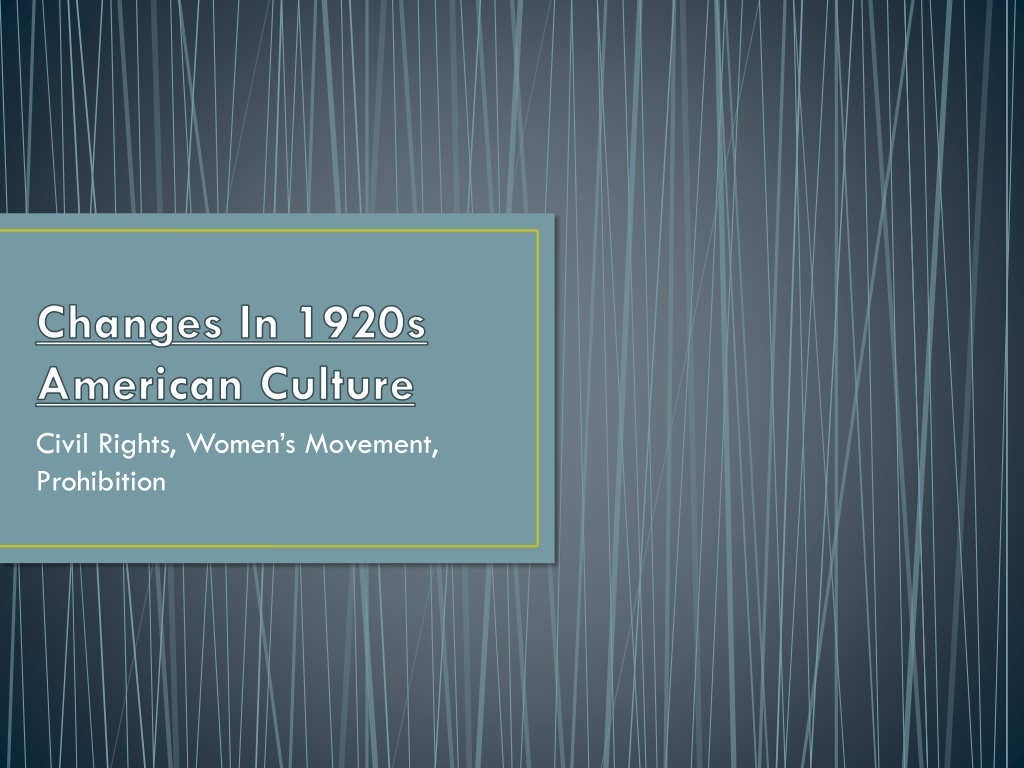
 undefined
undefined









